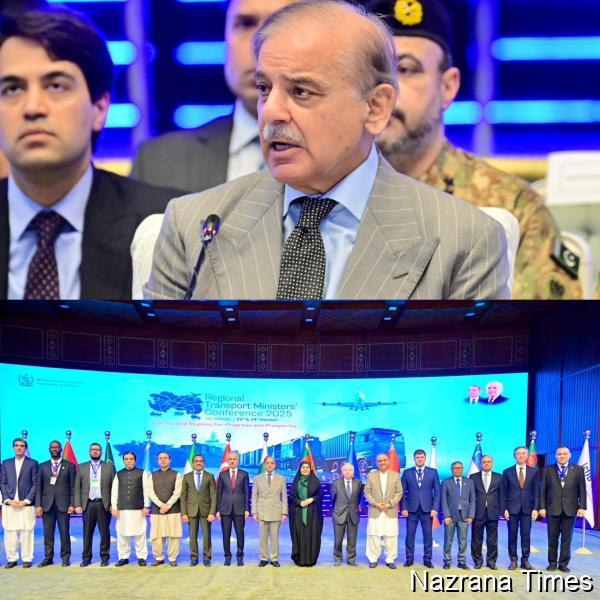PM Shehbaz Sharif: “Regional Links Will Transform Trade and Economy”
- Internationl
- 24 Oct,2025

Promotion of Regional Connectivity Will Bring a Revolution in Economic and Trade Sectors – Prime Minister Shehbaz Sharif’s Address at the Closing Session of the Regional Transport Ministers Conference
Islamabad, October 24 (Nazrana Times) Ali Imran Chattha
Prime Minister Muhammad Shehbaz Sharif emphasized the importance of bilateral and regional connectivity, stating that the promotion of regional links will bring a revolution in the economic and trade sectors. He said that cooperation in trade, economy, and energy will mark the beginning of a new era. “Since ancient times, our region has served as an economic and trade corridor, and its growing economic significance has further enhanced its importance. Pakistan is now entering the second phase of the China-Pakistan Economic Corridor (CPEC). Work is also underway on railway connectivity projects, including the Trans-Afghan Railway and the Islamabad-Tehran-Istanbul corridor. In this digital age, connectivity has expanded to data, innovation, and technology,” he said while addressing the closing session of the Regional Transport Ministers Conference on Friday.
Delegates from more than 20 countries participated in the conference. Federal Minister for Information and Broadcasting Attaullah Tarar, Federal Minister for Communications Abdul Aleem Khan, and Federal Minister for Railways Muhammad Hanif Abbasi were also present.
On behalf of the Government and people of Pakistan, the Prime Minister thanked all the visiting delegates and guests, noting that hosting such a significant conference holds great importance for Pakistan, especially at a time when the global landscape of transport and connectivity is rapidly evolving.
He said that for centuries, the land that now constitutes Pakistan has been a hub of connectivity and a key passageway. “We have heard the glorious stories of eras when this region served as a conduit for trade goods, cultural traditions, and creative ideas among dozens of nations. From the ancient Silk Route to today’s Belt and Road Initiative, our region has always been a land of connections and opportunities. In today’s shifting geopolitical and economic realities, this ancient corridor has been revitalized, transforming a historic legacy into a strategic necessity for our future,” he remarked.
Prime Minister Shehbaz Sharif said that our region, stretching from the warm waters of the Arabian Sea and the Persian Gulf to the mighty mountains of the Karakoram and Himalayas and the vast plains of the Indus Valley, is uniquely positioned at the crossroads of China, Eurasia, and the Middle East. “It serves as a central hub connecting China, Central Asia, and the Middle East’s economic corridors. Pakistan’s long coastline, including the ports of Gwadar and Karachi, links the sea to the Silk Route,” he added.
The Prime Minister recalled that former Prime Minister and his leader, Muhammad Nawaz Sharif, has always believed that peace and development are interlinked. “One of his earliest actions after being elected Prime Minister in June 2013 was signing the agreement for the China-Pakistan Economic Corridor (CPEC), a flagship project of President Xi Jinping’s Belt and Road Initiative. CPEC has proven to be a transformative project that has connected markets and people across China, Central Asia, South Asia, and the Middle East,” he stated.
He further said that by linking Gwadar Port with China’s Xinjiang province, CPEC has opened new avenues of trade and energy cooperation, becoming a vital channel for connectivity, opportunity, and cultural exchange. “I am proud to announce that following the success of the first phase of CPEC, we are now entering its second phase, which will promote business-to-business partnerships, expand investment opportunities for Chinese companies in Pakistan, and usher in a new era of mutual prosperity,” the Prime Minister said.
He added that Pakistan is working on several railway connectivity projects, including the Trans-Afghan Railway and the Islamabad-Tehran-Istanbul corridor, which will revolutionize cross-border trade and linkages. “Similarly, improved air connectivity with Central Asian countries and frameworks like the TIR Convention (for international road transport) are strengthening our regional cooperation,” he noted.
Expressing optimism, the Prime Minister said these grand initiatives will unite the economic potential of regional countries and launch a new era of trade, economic collaboration, and energy sharing. “In today’s digital era, connectivity is no longer limited to roads, railways, or air routes—it now extends to data, innovation, and technology. Pakistan is investing in digital infrastructure to keep pace with the Fourth Industrial Revolution. Initiatives such as the Pakistan Single Window are revolutionizing trade processes, reducing bureaucratic hurdles, and making cross-border transactions more efficient,” he explained.
He added that Pakistan is actively engaging with global forums to enhance trade, energy exchange, and cross-border transport networks. “It must be reiterated that collaboration in trade and economic cooperation yields mutual benefits for all and strengthens our shared quest for peace and prosperity in the region,” he said.
Concluding his address, Prime Minister Shehbaz Sharif invited all participants to work together in sowing the seeds of cooperation so that future generations may reap the fruits of progress and prosperity.
On this occasion, Federal Minister for Communications Abdul Aleem Khan stated that the Regional Transport Ministers Conference reflects our shared commitment to enhancing regional connectivity. He said Pakistan is striving to strengthen regional links and economic growth, emphasizing that boosting regional trade is vital for the development of the entire region. The conference, he added, provided an important platform for dialogue on promoting connectivity.
At the end of the ceremony, Prime Minister Shehbaz Sharif visited the exhibition, inspected various stalls, and interacted with representatives of different Pakistani companies. Stalls set up by the NLC, NHA, and Pakistan Railways were among the highlights of the exhibition.
Posted By:
 TAJEEMNOOR KAUR
TAJEEMNOOR KAUR


Leave a Reply